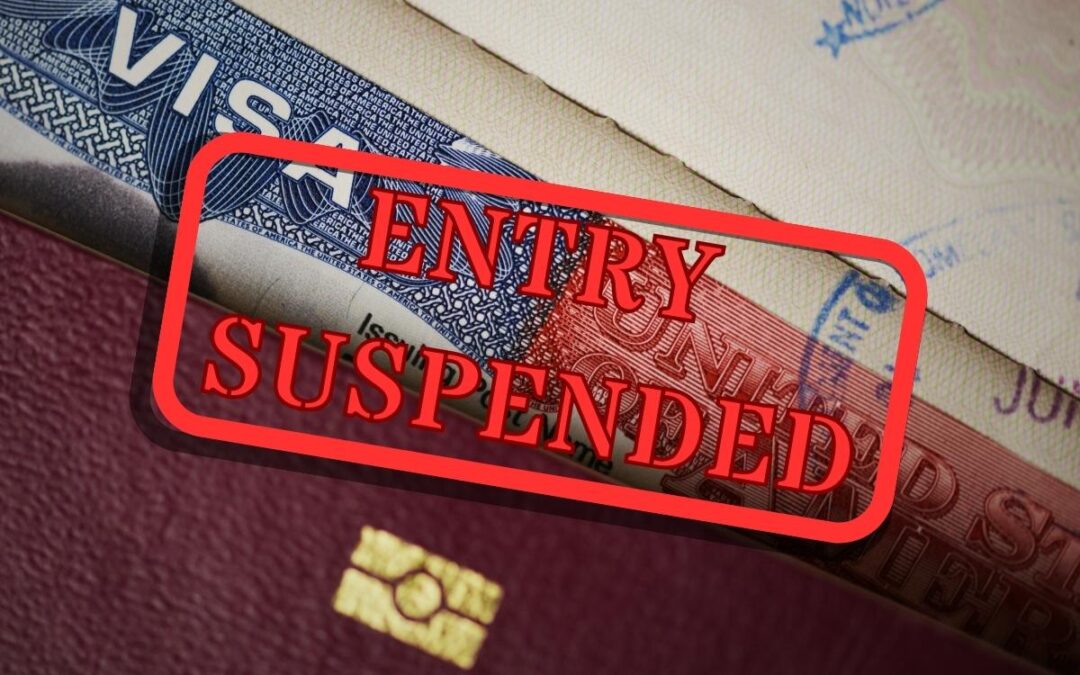On June 4, 2025, President Trump signed a proclamation implementing a comprehensive U.S. travel ban affecting nationals from 19 countries. The 2025 immigration restriction took effect on June 9, 2025, impacting travellers, immigrants and their U.S.-based families.
This action was based on the presidential proclamation titled: “Restricting the Entry of Foreign Nationals to Protect the United States from Foreign Terrorists and Other National Security and Public Safety Threats.”
This proclamation outlines new entry restrictions under Section 212(f) of the Immigration and Nationality Act due to concerns over vetting, deportation refusal, and national security threats.
Understanding the policy is crucialfor anyone navigating the current immigration process.
How The 2025 U.S. Travel Ban Works
The U.S. travel ban of 2025 is a federal order that suspends entry into the United States, either fully or partially, for nationals from countries identified as lacking proper background check systems or refusing to cooperate with U.S. deportation efforts.
There are two categories of restrictions.
Full Entry Suspension (12 Countries)
Nationals from the following countries are affected by a full U.S. entry suspension under the 2025 U.S. travel ban policy:
- Afghanistan: Controlled by Taliban, lacks competent authority for document issuance
- Burma (Myanmar): 27% tourist visa overstay rate, deportation refusals
- Chad: Nearly 50% tourist visa overstay rate
- Republic of the Congo: 30% tourist visa overstay rate
- Equatorial Guinea: 70% student visa overstay rate
- Eritrea: No criminal records available, deportation refusals
- Haiti: 31% tourist visa overstay rate, lacks a central authority
- Iran: State sponsor of terrorism, deportation refusals
- Libya: No central authority, terrorist presence
- Somalia: Terrorist haven, no government control
- Sudan: 26% visa overstay rate, inadequate vetting
- Yemen: No central authority, active U.S. military operations
Partial Entry Suspension (7 Countries)
These countries face partial visa restrictions under the U.S. travel ban, targeting specific visa types, primarily targeting tourist visas (B1/B2), student visas (F), vocational student visas (M), and exchange student visas (J).
- Burundi: 15% tourist visa overstay rate
- Cuba: State terrorism sponsor, deportation refusals
- Laos: 35% tourist visa overstay rate, deportation issues
- Sierra Leone: Deportation non-compliance
- Togo: 19% tourist visa overstay rate
- Turkmenistan: 15% tourist visa overstay rate
- Venezuela: Lacks competent authority, deportation refusals
Who Can Still Enter?
Certain individuals are exempt from the 2025 travel ban, including:
Protected Status Holders
- U.S. Permanent Residents (Green Card holders) from any country
- Refugees and asylum seekers, who remain protected under U.S. law
- Afghan special immigrant visa holders
Family and Relationship-Based Exemptions
- Dual citizens using passports from countries not on the banned list
- Immediate family of U.S. citizens with clear and convincing evidence of identity and relationship
- Adopted children under specific visa categories.
Official and Professional Exemptions
- Diplomats and international organization officials
- Religious and ethnic minorities facing persecution in Iran
- Athletes, coaches and immediate relatives required to travel for the World Cup, Olympics or other major sports event as determined by the Secretary of State.
What Current U.S. Residents Should Know
If you’re currently in the U.S. on a valid visa issued before June 9, 2025, the travel restrictions do not affect your legal status or ability to remain in the country.
Will the U.S. Travel Ban Policy Change in the Future?
The current immigration ban is not permanent and may be reviewed or modified in the future.
Within 90 days of June 4, 2025, and every 180 days thereafter, this proclamation will be reviewed by the Secretary of State, Attorney General, the Secretary of Homeland Security, and the Director of National Intelligence.
Reviews may result in suspensions being continued, terminated, modified or supplemented.
Get Help Understanding Your Options Under the U.S. Travel Ban
Whether you’re planning future travel, have family abroad, or need clarity on how the 2025 U.S. travel ban impacts your immigration status, these are not decisions to face alone.
At Pilkington Law Firm, our experienced immigration attorneys are here to help. We’ll guide you through your options and advise on how this policy applies to your situation.
Contact us today to speak with our legal team.
Follow Pilkington Law Firm
To stay updated on U.S. immigration policies, travel bans and legal developments.
____________________________________________________________________________
Disclaimer
This post is for informational purposes only and does not constitute legal advice. Immigration laws and policies can change quickly. For advice on your specific case, please consult with a qualified immigration lawyer at Pilkington Law Firm.
Source: Proclamation — Restricting the Entry of Foreign Nationals to Protect the United States from Foreign Terrorists and Other National Security and Public Safety Threats. President Donald J. Trump, June 4, 2025 View official Presidential Action on whitehouse.gov

